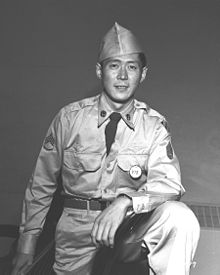Hiroshi Miyamura
Appearance

Staff Sergeant Hiroshi "Hershey" Miyamura (Japanese: 宮村 浩, October 6, 1925 – November 29, 2022) was a United States Army soldier and a recipient of the Medal of Honor, the United States military's highest award for valor, for his actions during the Korean War. He was one of the last two surviving Medal of Honor recipients of the Korean War, along with Ralph Puckett Jr.
Quotes
[edit]
Beyond Glory (2003) interview
[edit]- Note: Edited interview transcript featured in Beyond Glory: Medal of Honor Heroes in their Own Words (2003) by Larry Smith, New York: W.W. Norton & Company, hardcover, pages 165-183.
- I was resting, and some sergeant comes up to me and says, 'There's a guy from your home state wants to talk with you.' I said, 'Who?' He said, 'I don't know. Just follow me.' So I follow him into another room, nothing but lights in that room. A desk and a commanding general standing at the foot of it, a brigadier general of the Third Division. His name was Osborne. I was told to go up and see him. I'm wondering, 'What the hell am I going to see him for?' And he tells me, he says, 'Do you know you received the Congressional Medal of Honor?' All I could say was, 'What?' I'll never forget that. 'What for?'
Then he asked me to relate my story. Why? I figured. Hell, I said, 'Geez.' I figured I might get court-martialed. And I told him I just felt I was doing my job, doing what I was trained to do. I didn't think I was a hero deserving of the Medal. That's when he told me the reason they didn't let my family know was they were afraid of reprisal from the enemy. Even though they finally released names and all, they still didn't let my wife know I'd received the Medal. They just told her I was alive.
Then we were sent to a port of debarkation, and I was given a choice of flying home or going home by troopship with the rest of the fellas. I figured, geez, that's a good time to recuperate, get built up a little. I think I weighed ninety-eight pounds. That ship took nineteen days to reach San Francisco. I was seasick I think eleven days on that boat. I went to Italy and back on a ship, never got sick. I went over the Japan Sea, one of the roughest, never got sick. And here was the smoothest ride back home, and I got sick. Anyway, we docked in San Francisco and I was the first one to debark. They gave me that honor.- p. 180-181
- I was the type of person, and I still am, who always wanted to be in the background. I'm a good listener. I'd rather be a listener than the one up there doing the talking. All through my school years, I could never get up in front of a class, and talk, read even. But wearing the Medal requires us to be in the public's eye, especially for the youngsters, the schoolkids. We get asked to talk to them whenever we attend the Medal of Honor conventions. That has changed my life.
- p. 183
- I've been to so many places, met so many people. Whenever we have these conventions, you always meet the elite of the city and the state. And then the privilege of going to Washington, sitting with the Joint Chiefs of Staff during inaugurations. All the military organizations have banquets for us, and they foot a lot of the bills. So we meet so many people that you would never meet in your lifetime. Foreign dignitaries, go to embassies, stuff like that.
- p. 183
Quotes about Miyamura
[edit]- Cpl. Miyamura, a member of Company H, distinguished himself by conspicuous gallantry and intrepidity above and beyond the call of duty in action against the enemy. On the night of 24 April, Company H was occupying a defensive position when the enemy fanatically attacked, threatening to overrun the position. Cpl. Miyamura, a machine-gun squad leader, aware of the imminent danger to his men, unhesitatingly jumped from his shelter wielding his bayonet in close hand-to-hand combat, killing approximately 10 of the enemy. Returning to his position, he administered first aid to the wounded and directed their evacuation. As another savage assault hit the line, he manned his machine gun and delivered withering fire until his ammunition was expended. He ordered the squad to withdraw while he stayed behind to render the gun inoperative. He then bayoneted his way through infiltrated enemy soldiers to a second gun emplacement and assisted in its operation. When the intensity of the attack necessitated the withdrawal of the company Cpl. Miyamura ordered his men to fall back while he remained to cover their movement. He killed more than 50 of the enemy before his ammunition was depleted and he was severely wounded. He maintained his magnificent stand despite his painful wounds, continuing to repel the attack until his position was overrun. When last seen he was fighting ferociously against an overwhelming number of enemy soldiers. Cpl. Miyamura's indomitable heroism and consummate devotion to duty reflect the utmost glory on himself and uphold the illustrious traditions on the military service.
- Citation for the Medal of Honor awarded to Miyamura, presented by President Dwight D. Eisenhower at the White House in Washington, D.C., on 27 October 1953[1]

